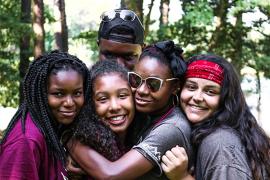As more and more students choose to take a gap year between high school and college, employers are starting to recognize the unique benefits that these students can bring to the workforce. Hiring students who have recently completed a gap year can provide a pipeline of qualified, energetic counselors to your staff and should not be overlooked as a pool to actively recruit.
Here are few reasons why hiring a student who took a gap year is the smart choice for camps.
They Have a Strong Sense of Purpose
Students who choose to take a gap year typically do so because they want to gain a deeper understanding of their interests and goals before committing to a college major or career path. This means that they are likely to have a stronger sense of purpose and direction, which can translate into a greater level of motivation and engagement on the job.
They Have Valuable Life Experience
During a gap year, students often travel, volunteer, or work in a variety of settings, gaining valuable life experience and skills that can be applied to any job. They may have learned how to communicate effectively with people from diverse backgrounds, problem-solve in challenging situations, or manage their time and resources effectively. In fact, a recent survey conducted by the Gap Year Association finds that 98 percent of gap year alumni report feeling more mature and confident as a result of their gap time. These skills are highly transferable and can make a big difference in the camp environment as both mentors to campers and co-counselors.
They Have Developed Strong Soft Skills
Soft skills, such as communication, teamwork, and adaptability, are highly valued in the camp environment. Students who take a gap year are likely to have honed these skills through their experiences, whether they were working in a team on a community service project or navigating a foreign culture while traveling. These skills can be difficult to teach in a traditional classroom setting, making gap year students potentially more prepared to succeed at camp than a student with the equivalent amount of college experience.
They Are More Mature and Independent
Gap year students have had the opportunity to live and work independently, often in challenging environments. This means that they are likely to be more mature, self-directed, and responsible than their peers who went straight from high school to college or the workforce. They are also likely to have a greater level of self-awareness and emotional intelligence.
They Bring Interesting Lived Experiences to Camp
Students who take gap years often seek out unique and diverse experiences that challenge their assumptions and broaden their perspectives. They may have traveled to different parts of the world, worked with people from different backgrounds, or pursued passions and interests that are outside of their comfort zone. This diversity of experience can bring fresh ideas, creativity, and innovation to camp, and help to foster a more inclusive and collaborative culture.
Finding and Hiring Gap Year Alumni
In order to benefit from this unique pool of students, make sure your application guidelines allow for a gap year to count towards relevant experience or the age requirement (eg "one year of college or a completed gap year"). You can also:
- Contact gap year programs: Reach out to gap year programs that offer structured gap year experiences and ask if they have an alumni network or job placement program. Some programs have relationships with employers who are interested in hiring gap year alumni.
- Use social media: You can use social media platforms like LinkedIn, Facebook, and Instagram to find gap year alumni. Use relevant hashtags like #gapyear, #explorethegapyear and look for individuals who have taken a gap year in their profile. You can also post job listings on these platforms and specifically target gap year alumni.
- Attend a USA Gap Year Fair: Gap year fairs are events where gap year programs, schools, and organizations come together to showcase their programs and opportunities. Attend these events to meet gap year alumni in person and discuss potential employment opportunities.
- Contact universities and colleges: Many universities and colleges have their own gap year programs or can connect you with alumni who have taken gap years. Reach out to career services departments or alumni networks to find potential candidates.
As more students consider taking gap years as a way to explore their interests and passions, camps should be open to considering these candidates as valuable additions to their teams. By doing so, they may find that they are able to identify top talent with unique skills and perspectives that can help their camps and campers thrive.
This blog was written on behalf of Project Real Job, whose purpose is to support camps in their efforts to recruit, hire, and retain staff.
Julia Rogers is a former camp programming director, traveler, business owner and experiential education expert who has spent the last 14 + years as a professional gap year counselor. As the founder of EnRoute Consulting, Julia oversees a social enterprise dedicated to fueling the gap year movement and developing a generation of compassionate, driven and resourceful global citizens. She partners with educators, service-learning organizations, non-profits, government entities and families around the world to develop creative educational pathways that result in young adults being better prepared to succeed in life and work. Julia is also a TEDx speaker, a podcast host and President Emeritus of the Gap Year Association, a US-based nonprofit dedicated to the intentional growth of the gap year option through research, standards-setting and advocacy efforts. You can reach Julia at [email protected].
Halfpoint/iStock via Getty Images
The views and opinions expressed by contributors are their own and do not necessarily reflect the views of the American Camp Association or ACA employees.





